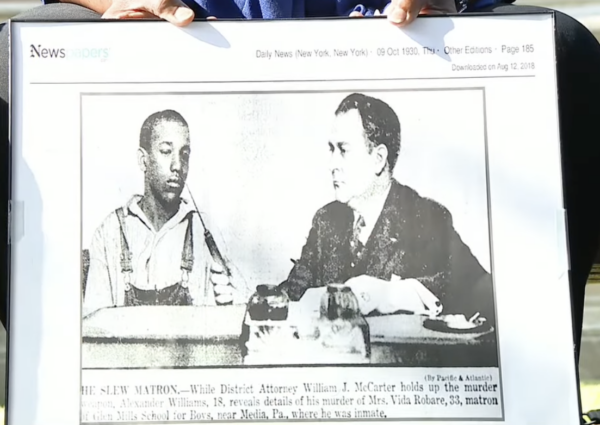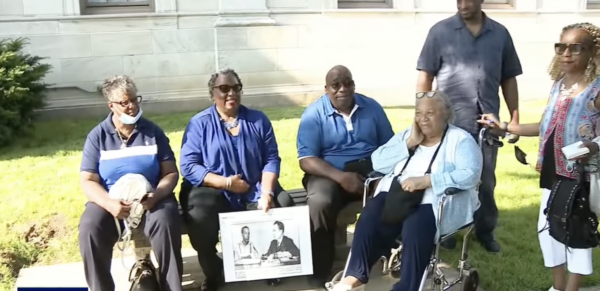Alexander McClay Williams, 16, was executed in June 1931, for a murder many believe he did not commit.
On Oct. 3, 1930, Vida Robar’s ex-husband, Fred Robare, discovered her body on the second floor of a cottage on the grounds of the Glen Mills School for Boys in Glen Mills, Pennsylvania, surrounded by a pool of blood. She had been stabbed 47 times with an icepick and left for dead with a fractured skull and broken ribs.
Williams, a student, confessed to the murder after enduring hours of violent interrogations. However, no evidence linked him to the case, and one detective said it would have been impossible for him to do it.

A judge overturned his conviction on June 13, 2022, 92 years after he was convicted in the same courtroom.
The ruling by Common Pleas President Judge Kevin F. Kelly granted Alexander a new trial. District Attorney Jack Stollsteimer immediately dropped the charges against the Black teenager, who the judge said dealt with “numerous fundamental due process violations” almost a century ago.
“All the hallmarks of the American justice system were disregarded in this matter,” Stollsteimer told Kelly. “Due process was violated, and this young man may have been an innocent party who was executed. We’ll never know the absolute truth, but what I can tell you from my reading of this record is this shouldn’t have happened.”
Alexander, the oldest of 13 children, was sent to the reform school after being accused of setting a barn on fire. The boy’s family said he was mentally challenged. Reports show that he was questioned five times and flogged during those interrogations, receiving up to 40 lashes from the officers in one instance.
The police conducted the interviews without a parent or an attorney present. Alexander was not assigned to an attorney until 17 days after he was charged, reports show. His attorney then had just 73 days to prepare his defense.
While detectives reportedly pressured Alexander, they did not investigate any other suspects in the case. Still, the county’s leading detective was quoted in a previously undiscovered article saying that the crime was committed by “a full-grown and strong man,” and that the athletic matron “could have fought off a boy.”
At just 125 pounds, Alexander was so small that something was placed underneath him to prop him up for the execution on June 8, 1931. He was the youngest person to be put to death in Pennsylvania.
Neumann University professor Samuel Lemon has researched Alexander’s case for 30 years. His great-grandfather, William H. Ridley, the first Black attorney in the county, represented the boy in the trial. Lemon lobbied for Alexander’s name to be cleared after he uncovered undisclosed evidence in the case, including the article quoting the detective.
“It frankly was an emotional burden for me for many, many years, but it was something I felt was an obligation I had to do for Alexander, for Vida Robare and for my great-grandfather as well,” said Lemon.
Lemon said that Robare’s death certificate named Alexander as her killer before he was even arrested. A bloody handprint was also discovered at the scene, but Alexander did not have any blood on him. Two fingerprint experts examined it, but it was left out of evidence at the trial.
Alexander was reportedly on work detail when the 33-year-old woman was killed. Prosecutors had to argue that he committed the crime within the 20 minutes he left the work crew to get a receipt for shovels.
Lemon, who went back and walked the grounds of Glen Mills, said Williams would have had to take about 15 actions in that time.
Alexander needed time to get to the crime scene, break into a storage locker, then go into Robare’s room and stab her. Then, he would need to clean the blood from his hands and clothes, take her keys and throw them in the pond, hide the murder weapon and return to the work area.
One witness testified that Williams did not have blood on him when he returned to the group, nor did he seem excited or nervous, Lemon said.
Susan Carter, 92, Alexander’s sister, who was a baby when the boy was executed, said he would’ve been more likely to flee the scene. Their parents did not talk about her brother much, but she said the family firmly believed he was innocent.
“I guess it wasn’t something that you talked about,” said Carter. “All my brothers and sisters said that he never killed that woman.”

Carter said she found hope that his name would be cleared when she met Lemon, who wrote a book about the hidden evidence in the case.
“It deeply troubled me many times thinking about this poor frightened boy sitting in an electric chair, not understanding why,” Lemon said. “That was an image I could not get out of my head, and it caused me great emotional distress at times.”
Lemon took all of his findings to defense attorney Robert Keller, who got Alexander’s record partially expunged in 2017, but Lemon and his baby sister pushed for more.
“This is a hall of justice,” Carter told the judge. “Let justice be done.”
One of the attorneys referred to the case as “racial profiling at its worst.”
Theresa Smithers, the victim’s ex-husband’s last living relative, said she believes her ex-husband killed her and used Alexander as a “handy” scapegoat.
Smithers found the couple’s divorce certificate, which shows Vida Robare suffered “extreme cruelty” during the marriage. Fred’s great-great niece also testified that a watch and money were left on a dresser after the killing, and any other culprit would have taken the items.
Fred “got away with murder,” Smithers said.


